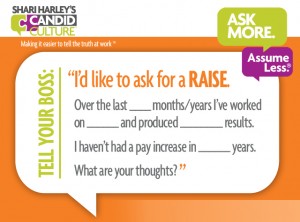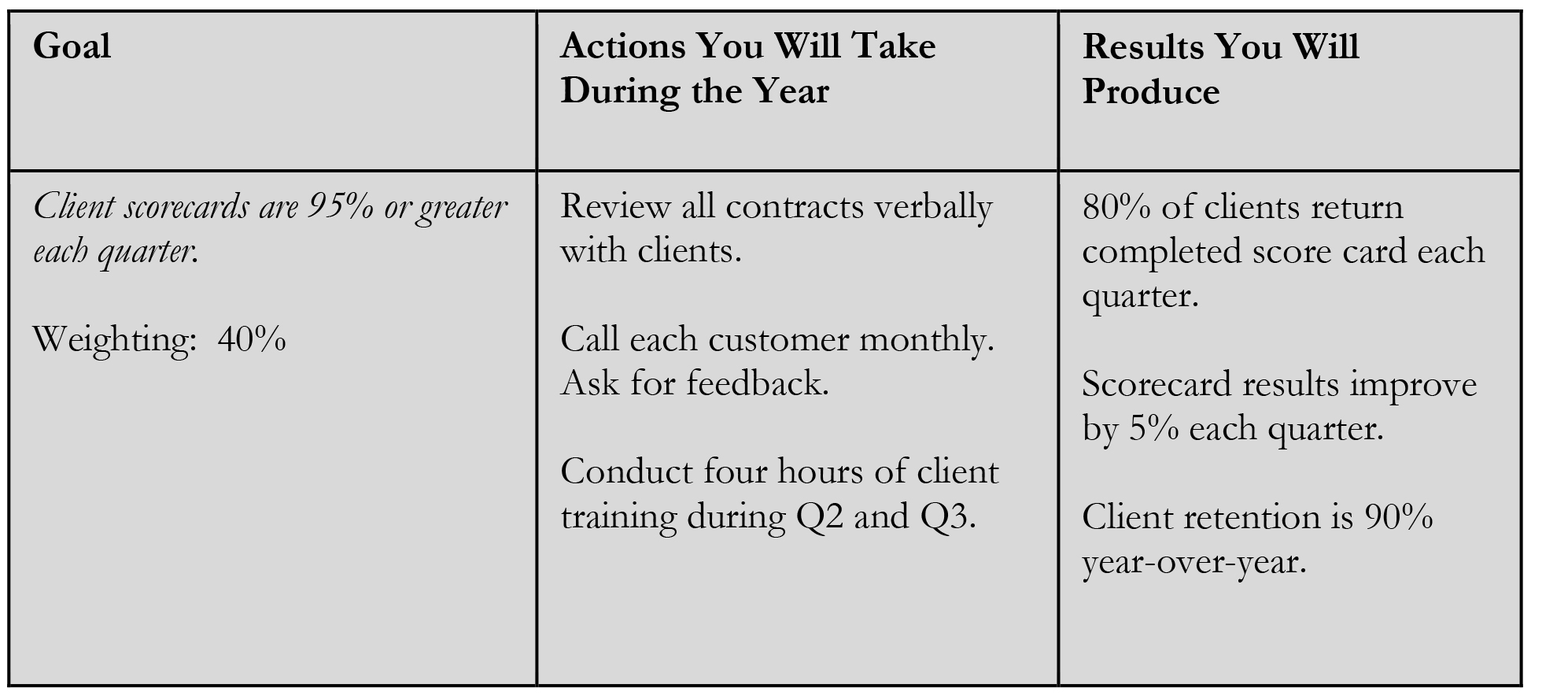Posts Tagged ‘career management’
 When I landed my first ‘real’ job after graduating from college I was so scared, I almost turned the job down. It took me five years to finish my first book, How to Say Anything to Anyone, in part because I was afraid no one would like it.
When I landed my first ‘real’ job after graduating from college I was so scared, I almost turned the job down. It took me five years to finish my first book, How to Say Anything to Anyone, in part because I was afraid no one would like it.
It seems anything worth doing is worth fearing.
I’m not talking about taking risks for the sake of risk –driving as fast as your car can take you, not paying your bills to see what will happen, or offering a counter point of view at work for the sake of doing so. I’m talking about pursuing the things you really want, that speak to your true purpose.
Being afraid doesn’t mean you can’t do something, nor does it mean that you shouldn’t. Feeling some fear just means what you want is outside of what you know you can do. But it’s the edge and the unknown that is juicy and rich.
During the past two years I’ve been pursuing things I’m terrified of, that I don’t know I can do. Yet I want these things, so I pursue them in the face of fear. And I have to admit, that as I get closer to getting what I want, the fear doesn’t dissipate, it actually gets worse . As I can almost taste having what I want, I get more scared. And sometimes I pull back, thinking, maybe I don’t really won’t those things. Maybe I was wrong. Then I remember why I want what I want and step back into the pursuit, despite the fear.
Don’t misinterpret fear as a reason not to do something.
A few suggestions for how to face your fears at work:
1. Write your desires down and/or tell people what you want.
- You’re more likely to get what you talk about having.
2. Take one step towards having what you want.
- Talk to someone who either has what you want or can help you get what you want.
3. Put yourself in the place of most potential, where you can get what you want.
- If you want to work in a certain department, express interest in working on a project that serves that department.
- Tell your boss and people in leadership in your desired work area of your interest.
- Apply for a job in that area.
4. Be positive and persistent.
- No one wants to give a complainer an opportunity, and takes time to make a shift.
The key is to take one step, then another, then another. And when you feel fear, don’t let it stop you. Fearing the next job or opportunity doesn’t mean you can’t do it well, it just means you haven’t done it yet.
When you need encouragement to face your fears, hang our inspiring magnets at your desk. You have to believe in yourself just as much as the people around you believe in you.

 The time to ask for a raise isn’t at the end of the year. In fact, the end of the year, when compensation decisions have likely already been made and you’re competing with everyone else in your organization for a finite pool of money, is the worst time to ask for a raise. The time to ask for a raise is at the beginning of the year, and it could sound like this:
The time to ask for a raise isn’t at the end of the year. In fact, the end of the year, when compensation decisions have likely already been made and you’re competing with everyone else in your organization for a finite pool of money, is the worst time to ask for a raise. The time to ask for a raise is at the beginning of the year, and it could sound like this:
How to ask for a raise:
“Next year I’d like to take on more responsibility and be earning _____. What would it take to get me there? I’ve written a few goals. Can we review the goals together and talk about if this is the right course of action to help me get to the next level?”
Set yourself and your boss up for success in giving you a raise. Significant pay increases need to be justified and approved by others in the organization. And results justify raises.
A few steps to take to get the pay increase you want:
- At the beginning of the year, you and your boss should agree upon goals that are important to the organization.
- Agree that at the end of the year, goal achievement will position you for more responsibility and more money.
No manager will promise a raise a year out, but ensure your career path is a conversation that will be had.
Given that you may want to ask for a raise now, here are some techniques for asking for more money in the middle of the year:
- Schedule time to talk with your boss, so you’re sure to have her undivided attention.
- Bring a list of accomplishments from the past months or years. Be sure to document those accomplishments in whatever format and level of detail your organization’s decision makers’ like to get information. You’ll know that by watching how the leaders communicate.
- Give your boss a copy of the list.
- Be bold. Use words like, “I’d like to talk with you about my career. It’s been _____ months/years since I’ve had a raise. I’ve generated __________ results. Can we discuss what it would take to get me to the next level?”
- Don’t say, “This is awkward and I’m uncomfortable asking, but I’d like to talk about my compensation.” That’s not a powerful way to ask for anything.
The worst you will get is a no. You won’t get fired or ‘in trouble’ for asking. And if you get a no, ask, “What do I need to do to position myself for a significant pay increase in the next year?”
When asking for money, time, or resources, it’s easier to say no than it is to say yes. So give your manager something that’s easy to say yes to.
When asking for a raise, say:
- “I’d like to position myself for more responsibility and more money.
- What do I need to do to do that?
- What’s a reasonable time frame to make that happen?
- Whose support do I need in addition to yours?
- What can I do to ensure the leaders who will also impact the decision are knowledgeable about my contributions?”
You will not get what you don’t ask for. So be bold, but also be deliberate, planful, and smart about how you ask.

Too many people sit at their desks doing their minimal best, while begrudging their boss, organization and current job, hoping that something better will come along. Or people do good work and think that someday someone will notice and they’ll get the role and recognition they deserve.
If you want to advance your career, you must know how to ask for more responsibility at work.
You may be rolling your eyes thinking, “More? I can’t do more. I already work evenings and weekends. I sleep with my phone and haven’t taken a vacation in two years, and you want me to do more?!?!?” Actually I want you to stop sleeping with your phone and take a vacation. But that’s a post for a different day.
When I say do more, I don’t mean do anything anyone asks nor anything your organization needs. Offer to take on more work that is aligned with what you want to do AND is important to the leaders of your organization.
Before starting Candid Culture, I ran an operations unit for a career college. Four years into my tenure with the company, one of my peers left, and his role wasn’t refilled. I felt his department was important to our organization’s success, so I offered to run it, in addition to my already big job.
My new department was a change agent’s dream. I outlined a strategic plan and long and short term goals. I re-wrote job descriptions and org charts. But six months into taking on the department, I couldn’t get one change approved. I was confused and frustrated.
I had initially been hired to turn another department around, and I’d been very successful at getting changes approved. Yet this time, I could get nothing approved. After six months of banging my head against a wall, I finally ‘got it.’ The owners of the company didn’t see the department as valuable, thus they weren’t willing to invest in it.
I’m embarrassed at how long it took me to see this. When my colleague’s senior level job wasn’t refilled and there was no freeze in hiring, I should have known the department wasn’t seen as important.
If you want to know what’s important in your organization, look at where money is being spent. Who is getting resources?
When I say ask for more, I mean be strategic about what you ask for.
Ask yourself these questions:
- What do I want to do?
- Where in the organization are there opportunities to do that kind of work – that is important to the organization’s leaders?
- Who will support me in doing this work? Who won’t?
How to ask for more responsibility at work. Tell your boss and/or department leader:
- I really enjoy working here. I enjoy the people, the work and our industry.
- I’m committed to growing my career with this organization.
- I’m interested in learning more about ________________________.
- I’d love to run ___________________________.
- I think we have some opportunities to make improvements in _____________________.
- How could I get some exposure to ____________________.
- A project is starting in ______________. I’d love to be on the team. What are your thoughts about that? Would you be comfortable supporting my participation? If yes, how can we make it happen? If not, what would you need from me in order to support it?
The work you take on does not need to be high level. Everyone in an organization does grunt work. Just be sure that whatever you offer to do is seen as integral to the future of the organization. You’re not likely to get what you don’t ask for.
Read chapter five of How to Say Anything to Anyone and manage your boss better.

 Many year-end performance reviews include whatever the manager and direct report can remember happening during the last six to twelve weeks of the year. For the most part, managers and direct reports sit in front of blank performance appraisals and self-appraisal forms and try to remember everything that happened during the year. The result: A vague, incomplete performance review that leaves employees feeling disappointed, if not discounted.
Many year-end performance reviews include whatever the manager and direct report can remember happening during the last six to twelve weeks of the year. For the most part, managers and direct reports sit in front of blank performance appraisals and self-appraisal forms and try to remember everything that happened during the year. The result: A vague, incomplete performance review that leaves employees feeling disappointed, if not discounted.
If you were disappointed by your performance review this year, don’t let it happen again next year. Take charge of your career by writing your own goals.
One of the first companies I worked for did the goal process so well, I learned early in my career how powerful well written goals could be. Each employee set five to seven goals. Experienced employees wrote their own goals and then discussed those goals with their manager. Less experienced employees wrote their goals with their manager. Managers wrote goals for inexperienced employees. The goals were so specific and clear that there could be no debate at the end of the year whether or not the goal had been achieved. It was obvious. Either employees had done what they said they would, or they hadn’t. This made writing performance appraisals very easy. Very little on the appraisal was subjective. And this gave employees a feeling of control over their year and performance.
It’s great if you work for an organization or manager who works with you to write goals. If you don’t, write your own goals and present them to your manager for discussion and approval. Managers will be impressed you took the initiative to write goals and will be thankful for the work it takes off of them.
Goals should be simple and clear. It must be obvious whether you achieved the goal or not. There should be little if any room for debate.
Sample goals are below.
Desired Outcome (goal):
• Improve client feedback – too vague
• Get better written reviews from clients – better
• 80% of clients respond to surveys and respond with an average rating of 4.5 or above – best
Actions you will take to achieve the goal:
• Ask clients for feedback throughout project — too vague
• Ask clients for feedback weekly – better
• Visit client site weekly. Talk with site manager. Ask for feedback — best
Goal template:

Completed sample goal:

How to approach your manager with written goals:
Try using this language with your manager: “I want to be sure I’m working on the things that are most important to you and the organization. I’ve written some goals for 2014 to ensure I’m focused on the right things. Can we review the goals, and I’ll edit them based on your input? And what do you think of using the agreed-upon goals to measure my performance in 2014?
You have nothing to lose by writing goals and presenting them to your manager. You will gain respect from your manager, clarity of your 2014 priorities, and more control of your year-end performance review. Give it a try, and let me know how it goes.
If you want more feedback from your manager, ask these questions.

 Coming to work in costume on Halloween? Whatever you wear to work is likely to be captured by someone’s phone and shared . . . widely.
Coming to work in costume on Halloween? Whatever you wear to work is likely to be captured by someone’s phone and shared . . . widely.
None of these are work appropriate Halloween costumes:
- Your boss
- Your boss’s spouse
- An employee who is “regrettably” no longer with the organization
- Whatever fit ten years ago
Sometimes people forget that work parties are still work and work appropriate Halloween costumes should be worn.
This reminds me of a participant I had in a public speaking class several years ago. While doing a presentation, in class, he told a story about being ten years old and playing outside in his neighborhood when he realized he needed to go to the bathroom. He raced home, but didn’t make it. He ended up going to the bathroom outside, next to his house. After that class, every time I saw the guy in the hallway at work, I had the image of him pooping next to his house and years later the image remains with me.
Telling that story was a bad call. It created a long-lasting impression I doubt he wanted his co-workers to have.
long-lasting impression I doubt he wanted his co-workers to have.
Impressions are made more quickly than they are forgotten. Have fun on Halloween, just not too much fun. If you wouldn’t want to see a photo of you in costume hanging in your organization’s lobby or on your website, don’t wear it to work.
 We’ve all received work from another person that wasn’t what we were expecting, hit reply, and told the other person what we thought. Then we dealt with the consequences.
We’ve all received work from another person that wasn’t what we were expecting, hit reply, and told the other person what we thought. Then we dealt with the consequences.
A few tips for giving feedback to get more of what you want and less of what you don’t:
Don’t give feedback via email. Ever. You can’t manage your tone or see the person’s reaction.
Practice the 24-hour rule and the one week guideline. Wait until you’re not upset to give feedback, but don’t wait longer than a week.
It’s almost impossible to give feedback without putting the other person on the defensive. Becoming defensive when receiving feedback is normal and natural. It’s a way to protect ourselves when we feel attacked.
When people are defensive, it’s hard to listen and respond. The less defensive the other person becomes, the easier it is to communicate with that person. People will be less defensive if you give feedback when you’re calm and choose your words carefully.
Communicate in a way that the relationship needs versus what you need in the moment.
When we give feedback when we’re upset, we’re really communicating for us, not for the other person. I didn’t get what I want. I’m upset. And I’m going to tell you about it. Then the other person gets upset and now, in addition to you not getting what you wanted in the first place, you have to do damage control.
Communicating in a way the relationship needs means choosing the timing, words and method of communication that is likely to produce the result you want – the other person being able to hear you, while becoming minimally defensive, and taking action. Giving feedback when you’re upset, especially via email, will not produce the result you want. You’ll only damage your relationship.
Being a good communicator and maintaining good business relationships requires patience and self discipline. This is something I work on ALL the time. Last week I sent one of my vendors feedback via email, when I was upset, and spent two days trying to recover. I sent a minor email with critique, he felt attacked, and I damaged our relationship.
It doesn’t take much to raise someone’s defensiveness to the point that you have to do damage control.
Wait to give feedback until you’re not upset. Don’t send an email. Pick up the phone or walk to the person’s desk. Deliver the feedback in a way the other person can hear you. Be ready for him to become defensive. It’s human to become defensive. You can’t eliminate defensiveness, but how you deliver feedback can greatly reduce it. And you’ll get more of what you want and less of what you don’t.
Read How to Say Anything to Anyone and get the words to have even the toughest conversations.

 It’s hard to come back to work after a long weekend, no matter how much you like your job. As fun and fulfilling as work can be, we all struggle with back to work blues from time to time.
It’s hard to come back to work after a long weekend, no matter how much you like your job. As fun and fulfilling as work can be, we all struggle with back to work blues from time to time.
If you’re having a hard time getting back into it today, here are a few things to try:
- Be realistic about how much you’re going to do today. Move a few things on today’s to-do list to tomorrow, or maybe Wednesday. Setting unrealistic goals sets people up for frustration and feelings of failure.
- Pick one or two things you’re going to do today, and finish those two things.
- Do one thing at a time. Not five.
Stress occurs when we’re thinking about the past or the future. When we’re in the moment, there is nothing to stress about. You’re focused on what you’re doing, nothing else. This is easier said than done, which is why I do yoga. If I’m thinking about anything but the teacher’s instructions, I fall over.
- Plan something fun. When is your next vacation? What are you looking forward to? Having something fun and exciting on the horizon is motivating and keeps us going.
- If you’re not having fun at work or you’re feeling stuck, tell someone who can do something about it. Most people are so afraid of being fired, they don’t speak up at work. From my experience it’s not so easy to get fired. Look around. I suspect there are several people you work with who you think deserve to be fired, yet there they are. Worry less. Speak up more. No organization is going to fire you for wanting and being willing and able to do more.
If after all of these BRILLIANT suggestions you still find yourself in the back to work blues, gossip about a few people who haven’t made it in yet today, eat someone else’s lunch from the refrigerator that looks better than what you brought, and re-arrange the most organized person’s desk. And all will be well.
Advance your career and manage people with our top three sellers.



 A few weeks ago I received an email from a candidate for a job I recently filled. His grammar, in the email, wasn’t great. The job requires writing, so I asked for a writing sample. The writing sample I received was riddled with spelling and grammar errors.
A few weeks ago I received an email from a candidate for a job I recently filled. His grammar, in the email, wasn’t great. The job requires writing, so I asked for a writing sample. The writing sample I received was riddled with spelling and grammar errors.
When I rejected the candidate, because of his bad grammar and spelling, some of my friends defended the candidate saying that spelling didn’t predict how successful someone would be and that poor writing is incredibly common in this country.
Their comments reminded me of the graduate level leadership class I taught a few years ago. Many of my master’s level students’ grammar was so poor, when I handed back my students’ first papers, I gave them a grammar lesson. Some class members were so offended and annoyed by this, they reported me to the dean, telling her that they did not pay $1500 for a grammar lesson. My stand remains the same.
I don’t care how great a leader you are. If you discredit yourself in every email you send by using bad grammar, your career will be limited.
Here are some common examples of bad grammar in both written and spoken communication:
- “A lot” is two words.
- Incentify is not a word. Incent is.
- Too means also. To does not.
- There is no B in supposedly.
- Your crazy aunt can only visit once a year without you wanting to change your address, and this does not mean that you’re a bad person.
- You accept advice. You advise others.
- There is no X in especially.
- You lose your marbles when you don’t get enough sleep. Your jeans become loose when you stop eating Snickers bars.
- You accept advice, except when you think the other person isn’t the sharpest tool in the shed.
- Irregardless is not a word. Regardless is.
- “Where you at?” “Where are you,” will do.
- Please put your contact information on the bottom of your initial and reply emails. This is not a grammar thing, it would just be helpful.
Call me picky or old school. But I suspect that when you hear these errors made in conversation or see them in writing, you judge the other person. I know most hiring managers do. Hiring managers want to know employees can write reports and email clients without embarrassing the company.
You will be eliminated as a job candidate if your resume has typos. People will judge you when you use incorrect English. They won’t tell you they’re judging your bad grammar. They’ll do it quietly or talk about you when you’re not there.
I spoke at a conference a few weeks ago where an attendee asked how to tell an employee she was going to be fired because her writing was so poor. She maintained client files and wrote client correspondence. Clients’ names were often wrong, in her written notes, as was spelling and grammar. The typos and grammar errors were a deal breaker. And they may be in your job as well.
Have someone proofread a few of your emails and reports, and ask for feedback on your writing. Ask the coworkers you’re close to to tell you when you make grammar errors in meetings. Of course you want them to tell you privately, after the meeting.
I write a bi-monthly column for the Denver Business Journal. I’m grateful that my editor reads this blog and emails me the typos and errors I make. I am not exempt.
Clean up your bad grammar and your writing, and accelerate your career. I promise it will work.
 Unfortunately you probably already know that people have a tendency to talk about you, not to you. It’s human nature. Sometimes it’s gossip. Other times senior leaders talk about your future with the organization. If you want to advance your career, you need to know what the people whose opinions you care about say about you when you’re not there.
Unfortunately you probably already know that people have a tendency to talk about you, not to you. It’s human nature. Sometimes it’s gossip. Other times senior leaders talk about your future with the organization. If you want to advance your career, you need to know what the people whose opinions you care about say about you when you’re not there.
Unfortunately most people get very little feedback at work. If today was the day of your performance appraisal and I asked how your boss and whoever else provides input on your review would rate you, you probably don’t know. This lack of knowledge prevents you from advancing your career.
Not knowing someone’s opinion doesn’t mean you’re not subject to it. Akin to getting a speeding ticket when you didn’t know you were speeding. The cop doesn’t care. He adds four points to your driving record, despite that you didn’t know the speed limit.
You may work for a manager who gives feedback. You may not. It doesn’t matter. There are people in your life who will tell you the truth (as they see it), if you ask.
I recommend assembling a core group of people who you count on to tell you the truth. These are the people who know you well and have your back. They can be friends, family members, past coworkers, customers, or managers.
You might wonder, “What can my mom or friends from high school or college tell me about how I behave at work?” The answer–a lot.
We don’t become different people when we arrive at work. We are who we are. If you’re often late, break commitments, or wear clothing that’s not your friend, you do those things at home and at work. Likewise, if you have great attention to detail, never break commitments, and always look great (in public), you friends and family know.
Identify a few people, personal and/or professional, who care about you and will tell you the truth.
Tell these folks you want to eliminate your blind spots. Ask them for specific feedback, and promise that no matter what they say and how hard it is to hear, you will say “thank you.” Then be sure to manage yourself. It’s normal to become defensive when we get constructive feedback. But every time we become defensive, we train people it’s not safe to tell us the truth. If you want people to give you feedback, more than once, make it easy to tell you the truth.
You may be thinking that asking for feedback is unrealistic. People won’t be honest. And you can’t take it.
The people who really care about you will be honest, and you can take it. You’ll be fine. In fact you’ll be better off than before you had the conversations. You might hear things that pleasantly surprise you. And the things you don’t like? Just because no one talked to you about them before you asked, doesn’t mean those behaviors didn’t impact you. Now you can do something about them.
Get out of the dark and into control. Discover your reputation and advance your career.
 Despite what you may think, your manager has enough to do. So when you drop a problem at her door, she finds it annoying. Rather than just alerting your manager and the leaders in your organization to the things that need to be fixed, go one step further, and be a change agent by offering a solution yourself.
Despite what you may think, your manager has enough to do. So when you drop a problem at her door, she finds it annoying. Rather than just alerting your manager and the leaders in your organization to the things that need to be fixed, go one step further, and be a change agent by offering a solution yourself.
It’s fine to raise challenges. It’s better to raise challenges you’re willing to do something about. If you think two departments don’t talk to each other, bring them together. If you think a process is inefficient, propose a different way to get the work done. If you’re dissatisfied with software you’re using, offer to source three potential vendors and set up a demo. You’re doing the legwork and asking for a small investment of time.
When we ask for something at work, it often requires time, money, or both. Thus when an employee asks for something, it’s easier for a manager to say no than it is to say yes. “No” requires no work and no financial outlay. A “yes” may require both.
You make it easy to say yes to your requests when you’re acting as a change agent:
- Propose a solution to a problem.
- Offer to do the work to solve the problem.
- Ask for small things that are easy to approve.
If you’re overwhelmed and want to hire an additional person, but your boss isn’t convinced you need the headcount, ask for a temp for a finite number of hours. It’s much easier for a manager to say yes to a small and known investment amount than to the long-term commitment of hiring someone new. The point is to ask for something that is easy for your manager to approve.
The word “pilot” is your friend. If you want to make a major change, pilot a scaled down version of your proposed solution in one or two locations, rather than in your organization’s 10 locations. Again, asking for something small makes it more likely that you’ll be told yes.
The bottom line is to be part of the solution – as trite and overused as that phrase is. Don’t be the person who says, “That’s broken” without also saying, “and here’s how we can fix it. Can I give it a try?”
 When I landed my first ‘real’ job after graduating from college I was so scared, I almost turned the job down. It took me five years to finish my first book, How to Say Anything to Anyone, in part because I was afraid no one would like it.
When I landed my first ‘real’ job after graduating from college I was so scared, I almost turned the job down. It took me five years to finish my first book, How to Say Anything to Anyone, in part because I was afraid no one would like it.


 The time to ask for a raise isn’t at the end of the year. In fact, the end of the year, when compensation decisions have likely already been made and you’re competing with everyone else in your organization for a finite pool of money, is the worst time to ask for a raise. The time to ask for a raise is at the beginning of the year, and it could sound like this:
The time to ask for a raise isn’t at the end of the year. In fact, the end of the year, when compensation decisions have likely already been made and you’re competing with everyone else in your organization for a finite pool of money, is the worst time to ask for a raise. The time to ask for a raise is at the beginning of the year, and it could sound like this:


 Many
Many 


 Coming to work in costume on Halloween? Whatever you wear to work is likely to be captured by someone’s phone and shared . . . widely.
Coming to work in costume on Halloween? Whatever you wear to work is likely to be captured by someone’s phone and shared . . . widely. long-lasting impression I doubt he wanted his co-workers to have.
long-lasting impression I doubt he wanted his co-workers to have. We’ve all received work from another person that wasn’t what we were expecting, hit reply, and told the other person what we thought. Then we dealt with the consequences.
We’ve all received work from another person that wasn’t what we were expecting, hit reply, and told the other person what we thought. Then we dealt with the consequences.
 It’s hard to come back to work after a long weekend, no matter how much you like your job. As fun and fulfilling as work can be, we all struggle with back to work blues from time to time.
It’s hard to come back to work after a long weekend, no matter how much you like your job. As fun and fulfilling as work can be, we all struggle with back to work blues from time to time.


 A few weeks ago I received an email from a candidate for a job I recently filled. His grammar, in the email, wasn’t great. The job requires writing, so I asked for a writing sample. The writing sample I received was riddled with spelling and grammar errors.
A few weeks ago I received an email from a candidate for a job I recently filled. His grammar, in the email, wasn’t great. The job requires writing, so I asked for a writing sample. The writing sample I received was riddled with spelling and grammar errors. Unfortunately you probably already know that people have a tendency to talk about you, not to you. It’s human nature. Sometimes it’s gossip. Other times senior leaders talk about your future with the organization. If you want to
Unfortunately you probably already know that people have a tendency to talk about you, not to you. It’s human nature. Sometimes it’s gossip. Other times senior leaders talk about your future with the organization. If you want to  Despite what you may think, your manager has enough to do. So when you drop a problem at her door, she finds it annoying. Rather than just alerting your manager and the leaders in your organization to the things that need to be fixed, go one step further, and be a change agent by offering a solution yourself.
Despite what you may think, your manager has enough to do. So when you drop a problem at her door, she finds it annoying. Rather than just alerting your manager and the leaders in your organization to the things that need to be fixed, go one step further, and be a change agent by offering a solution yourself.